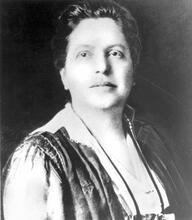Elizabeth Stern
Born in Poland in 1889, Elizabeth Stern immigrated to Pittsburgh with her family in 1892. Stern was a writer for the Philadelphia Sunday Record, the New York Times, the New York Evening World, and the Philadelphia Public Leader. Written under the pen name “Leah Morton,” Stern’s second autobiographical novel I Am a Woman—and a Jew (1926) is her most renowned work that focuses most directly on the struggle common to second-generation Jewish immigrant women in the early twentieth century: defining an identity within mutually exclusive familial, religious, and national boundaries. Stern’s work is notable for its focus on the lives of immigrant American women as they make transitions from one set of generational and cultural expectations to another.
Literary Legacy
“If I am truly part of America it was my mother, she who does not understand America, who made me so.” This description of a young woman’s identity formation, offered in the final chapter of Elizabeth Stern’s autobiographical My Mother and I (1917), observes a poignant irony. Stern’s work is notable for its focus on ironies and ambiguities in the lives of young and middle-aged American women as they make transitions from one set of generational and cultural expectations to another. Evident in the quoted passage and in the title of her second autobiographical novel I Am a Woman—and a Jew (1926) is a concern with the struggle common to second-generation Jewish immigrant women in the early twentieth century—defining an identity within seemingly mutually exclusive familial, cultural, religious, and national boundaries. In her own life, Elizabeth Stern achieved success within a number of realms and balanced a number of competing roles: fiction writer, journalist, social worker, wife, mother, and an American woman leading a secular life who examined the importance of cultural heritage. She worked for a variety of social service organizations.
Early Life and Family
Elizabeth Gertrude Levin was born on February 14, 1889, in Skedel, Poland, to Sarah Leah (Rubenstein) and Aaron Levin. Her family immigrated in 1892 to Pittsburgh, where her father was a rabbi. She earned her BA from the University of Pittsburgh, then moved to New York and attended the New York School of Social Work, where she met Leon Thomas Stern, who was to become a well-known penologist. They married in 1911 and had two sons, Thomas, in 1913, and Richard, in 1921. They lived in New York City, Galveston, and Philadelphia. She and her husband collaborated in research together on several occasions.
Journalism and Biographical Writings
Stern was a writer for the Philadelphia Sunday Record, the New York Times, the New York Evening World, and the Philadelphia Public Leader. Written under the pen name “Leah Morton,” I Am a Woman—and a Jew is the work that focuses most directly on themes of Jewish life in the United States. Telling the story of Leah’s early adulthood and middle age, the novel addresses questions of assimilation and position within “the melting pot.” Leah must confront a number of culturally inscribed perspectives: her husband’s ambivalence about his wife’s career, her parents’ disapproval of her secular values, a one-time boss’s antisemitism, and the opinion of some Jewish friends that her marriage to a gentile is “criminal.” The meaning of her cultural identity becomes increasingly important to Leah, and the book concludes with this statement: “I belong to my own people. My life is only a tiny atom of their long history.” Stern’s own sense of identification with Judaism was less definitive than Leah’s. She was affiliated first with the Philadelphia Ethical Society and later became active in Quakerism.
In addition to her two autobiographical full-length narratives, Stern published five novels. These books address social relationships and the family dynamic. Several focus on women’s roles and a mother’s influence on her daughter. Beginning in 1943, Stern turned to biographies and wrote three: one of businesswoman Margaret McAvoy Scott, another of inventor Josiah White, and finally The Women Behind Gandhi. Only My Mother and I and I Am a Woman—and a Jew have been reprinted, and Stern has received significantly less recent critical attention than two contemporaries with whom she is sometimes grouped, Mary Antin and Anzia Yezierska. Elizabeth Stern died in Philadelphia in January 1954, at age sixty-four.
Selected Works by Elizabeth Stern
A Friend at Court, with L.T. Stern (1923).
Gambler’s Wife (1931).
I Am a Woman—and a Jew (1926; reprint 1969, 1986).
Josiah White: Prince of Pioneers (1947).
A Marriage Was Made (1928).
Memories: The Life of Margaret McAvoy Scott (1943).
My Mother and I (1917).
Not All Laughter: A Mirror to Our Times (1937).
This Ecstasy (1927).
When Love Comes to Woman (1929).
The Women Behind Gandhi (1953).
Bannan, Helen M. “Elizabeth Gertrude Levin Stern.” American Women Writers: A Critical Guide From Colonial Times to the Present, edited by Lina Mainero. Vol. 4 (1980): 272–274.
Baum, Charlotte, Paula Hyman, and Sonya Michel. The Jewish Woman in America (1976).
BEDAJ.
Browder, Laura. Slippery Characters: Ethnic Impersonators and American Identities. Chapel Hill: University of North Carolina Press, 2000.
Kamel, Rose Yalow. Aggravating the Conscience: Jewish-American Literary Mothers in the Promised Land (1988).
Obituary. NYTimes, January 10, 1954, 86:14.
Uffen, Ellen Serlen. Strands of the Cable: The Place of the Past in Jewish American Women’s Writing (1992).
UJE.
Umansky, Ellen M. “Introduction.” I Am a Woman—and a Jew (1986).
WWIAJ, 1928, 1938.



